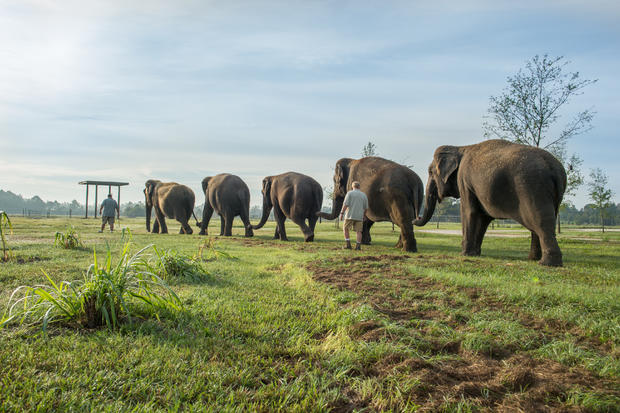Why elephants rarely get cancer - and what we can learn from them
Dr. Joshua D. Schiffman, a pediatric oncologist, was on a normal trip to Salt Lake City's Hogle Zoo in 2012 with his three children when he stumbled across an unlikely source of inspiration that would feed his current cancer research - elephant blood. The zoo's elephant caretaker Eric Peterson was explaining how the animals flap their large ears in order to circulate blood throughout the body when a light bulb went off in Schiffman's head.
Schiffman had previously been thinking about Peto's Paradox, which questions why large animals - like elephants - get cancer at significantly lower rates than smaller animals. Given the fact that large mammals like whales and elephants have more cells, the likelihood should be higher for them to develop cancer. But the opposite is true. An elephant can live to 70 years old and possesses 100 times as many cells as a person. Despite this, elephants experience a cancer death rate of less than 5 percent compared to a human cancer mortality rate of between 11 and 25 percent.
Schiffman had previously discussed the possibility of studying the genetics of these large creatures to better understand cancer with Carlo C. Maley, an associate professor at Arizona State University. When he was at the zoo, everything fell into place. He approached Peterson and asked if he could have access to some elephant blood for research.
Flash forward three years, and Schiffman is the co-senior author of a Journal of the American Medical Association study released on Thursday that looks into why elephants rarely get cancer and what that could mean for human cancer treatment.
"I think the real takeaway for me is essentially that evolution had over 55 million years to figure out how to prevent cancer in elephants, and now the challenge is to learn how to apply that knowledge to our own human patients," Schiffman told CBS News.
The study - a collaboration between the zoo, Huntsman Cancer Institute at the University of Utah, where Schiffman works, Primary Children's Hospital, and the Ringling Bros. Center for Elephant Conservation - found that elephants have 38 additional modified copies, or alleles, of a gene that encodes p53, a tumor suppressor. By comparison, humans only have two of these alleles.
Schiffman and his research team found that the elephant is something of a cancer-fighting super animal. Elephants kill damaged, cancer-prone cells at a rate double that of humans. Schiffman's lab works closely with patients who have Li-Fraumeni Syndrome, a rare hereditary disorder that increases the risk of developing certain cancers, like breast and a kind of bone cancer called osteosarcoma.
The researchers compared the cells of people with Li-Fraumeni Syndrome, healthy, cancer-free people, and elephants. Elephants killed pre-cancerous cells at a rate five times greater than people with the syndrome.
Schiffman said the findings are surprising, and that further elephant study could potentially lead to new developments in human cancer treatments. He added that there is a line of thinking that humans develop cancer so frequently because they "don't live the lifestyles they were evolved to live." From the lack of exercise to eating unhealthy foods, he said that modern humans have put themselves on a somewhat unnatural track.
After presenting some of his early findings at a conference, Schiffman was approached by another unlikely collaborator - the circus. The Ringling Bros. Center for Elephant Conservation reached out to Schiffman to see if he would like to analyze the samples of their herd of Asian elephants, the largest in North America. Schiffman had previously studied blood samples from African elephants and this gave him the opportunity to see if this cancer-fighting genetic capability extended beyond the sample group he was studying. The answer was yes, and Thursday, the circus's parent company, Feld Entertainment, announced a new funding effort to support this continued elephant research.
The circus has also pledged to donate $10,000 to the local children's hospital or treatment center in the next 50 cities it tours through. The Ringling Bros. Children's Fund will then match each donation with an additional $10,000 to the Primary Children's Hospital Pediatric Cancer Research Program.
The partnership is something of a win-win between Schiffman's team and the circus. The exposure surrounding this cancer research also underscores the importance of elephant conservation, Schiffman added.
Moving forward, what's next? Schiffman said it could be interesting to study the blood of other large animals, like whales and the naked mole rat that reportedly display low risks for cancer. Ultimately, Schiffman - who is a childhood cancer survivor himself - added that it is important to continue to find treatments and possible solutions for those with the disease.
"Ironically, the zoo is less than a mile from where I live and not much more than a couple miles from where I work," Schiffman said. "Every day I would drive by the zoo without realizing that the potential secrets to cancer prevention were right behind the zoo walls."
